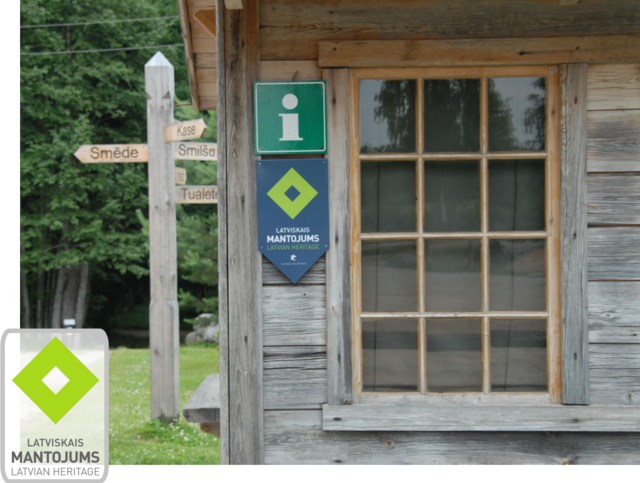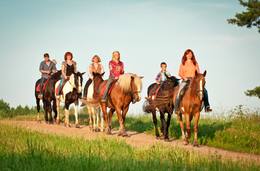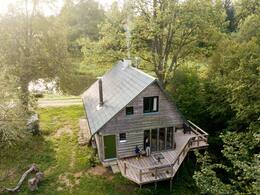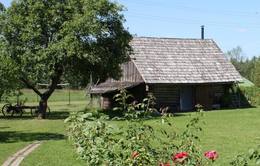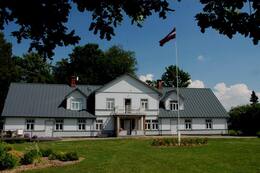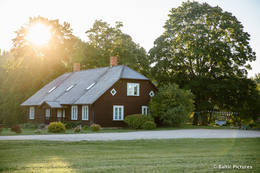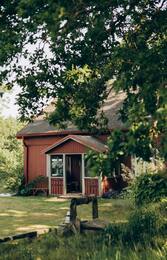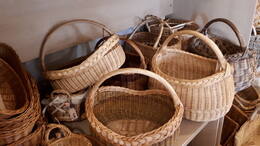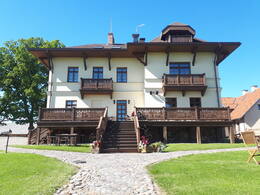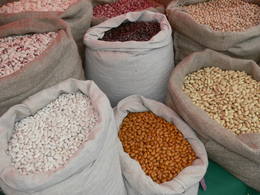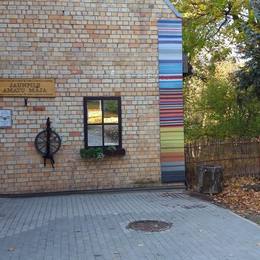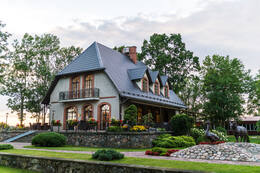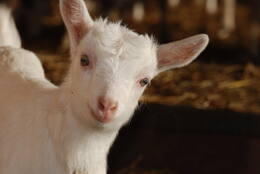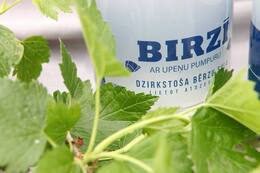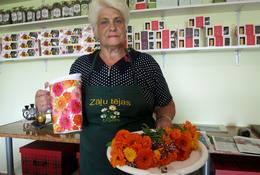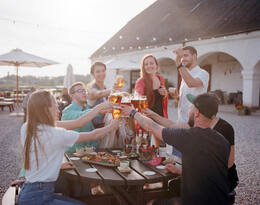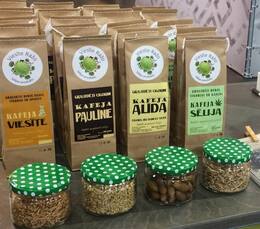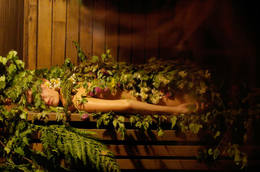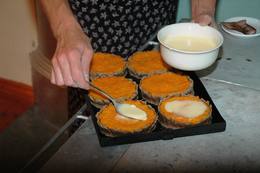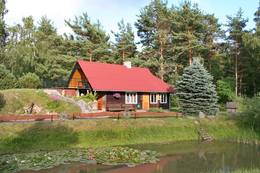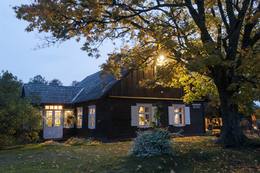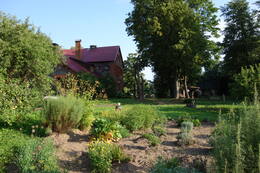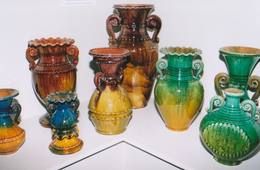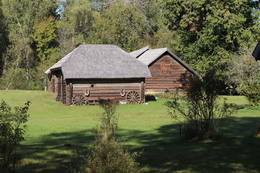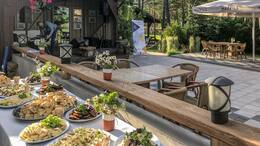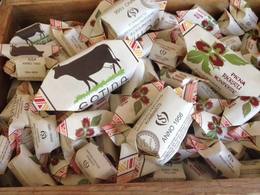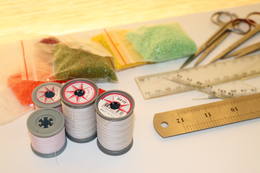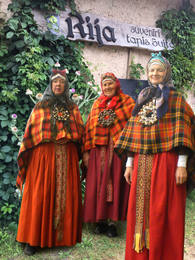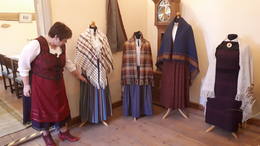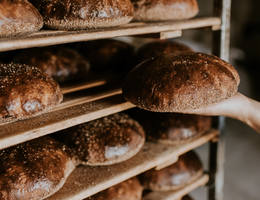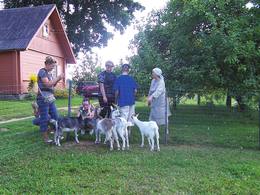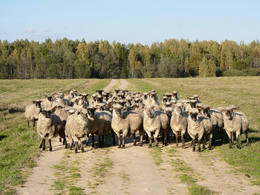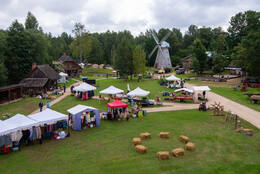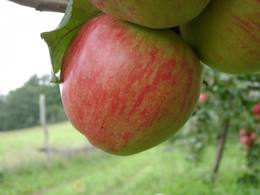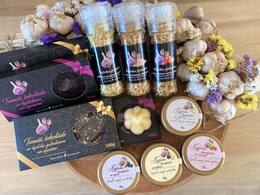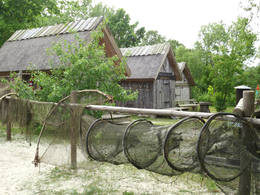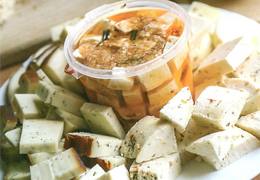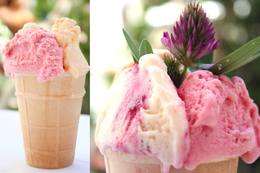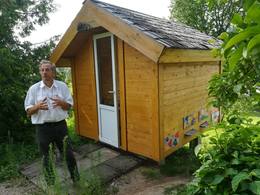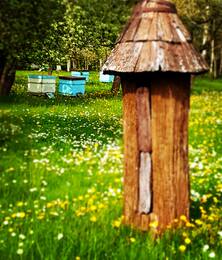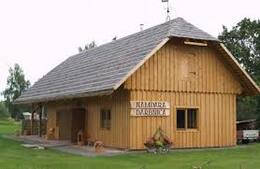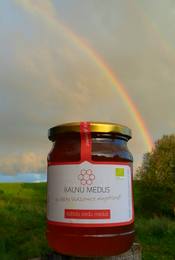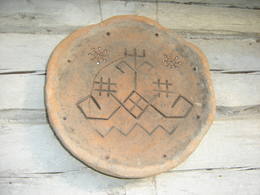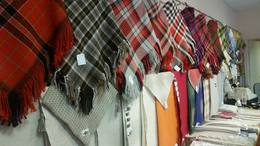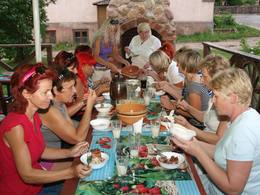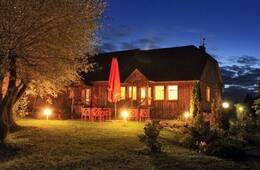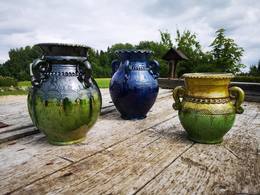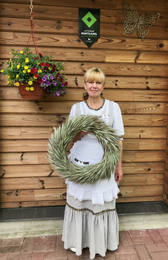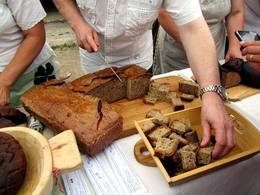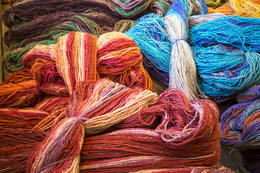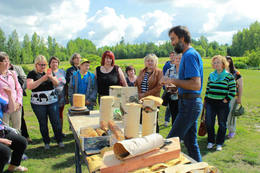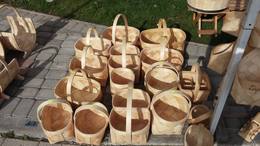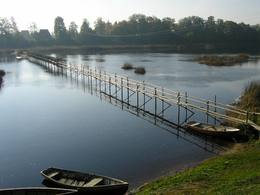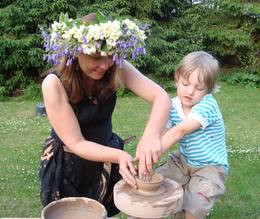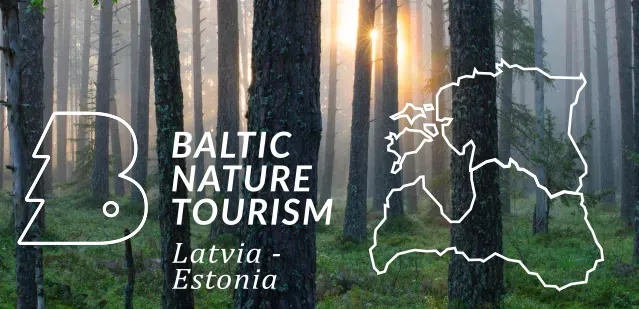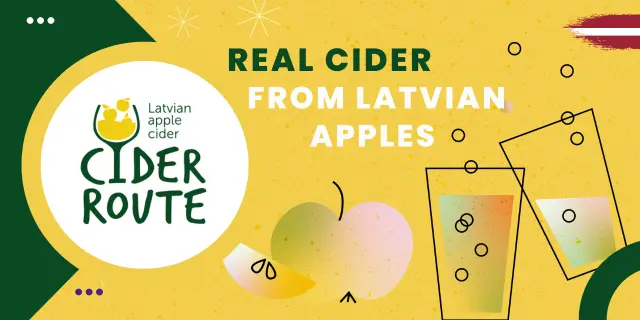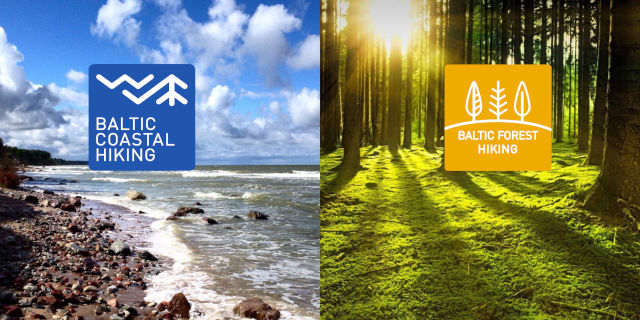Culture mark "Latvian heritage"
Das Zeichen des Lettischen Erbes wurde auf Initiative des Landtourismusverbandes „Lauku ceļotājs“ eingeführt und wird lettischen Reiseunternehmen verliehen, die das lettische Kultur- und Alltagserbe bewahrt haben und fördern bzw. den Reisenden präsentieren. Anhand dieses Zeichens sind die Orte zu erkennen, wo die Gastgeber bereit sind, Gästen die lettische Traditionen beizubringen, lettische Gerichte anzubieten, Gewerbe und Fähigkeiten zu unterrichten und lettische Feste zu feiern. Das Zeichen wird den Betreibern von Gästehäusern, Bauernhöfen, Handwerkern, Gaststätten, Veranstaltern der lettischen traditionellen Feiern, Museen, Sammlern und Fachleuten verliehen.
| Überblick | Details |
|---|---|
|
Lettland
von 60 EUR / Nacht
Pferdehof KLAJUMIThe horse farm features friendly and purebred horses from Latvia, Lithuania and Belarus (12 in all), as well as three different kinds of cosy dogs, rabbits, chickens, cows and cats. This is a true countryside environment involving four different homesteads – Klajumi, Ganiņi, Ķemeri and Krasti. Visitors can go horseback riding to visit the Rings of Daugava Nature Park and the frontier between Latvia and Belarus. Please be aware that personal identification is needed when entering the frontier zone. |
|
|
Lettland
von 50 EUR / Nacht
PIEKUNIPar latvisko pirts tradīciju uzturēšanu un daudzināšanu. “Piekūni” meklējami Gaiziņkalna pievārtē. Saimnieki piedāvā latviskos pirts rituālus, kur pēršanās procesu pavada dziesmas un zāļu tējas. Saimniece Anita ir arī vietējais gids, kura stāsta par Gaiziņkalna apkaimi, šejienes dabu un tradīcijām. |
|
|
Lettland
Gehöft für lettische Traditionen CAUNITESLATVIAN HERITAGE CULTURAL MARK IS AWARDED FOR: For popularisation and fostering of Latvian traditions. |
|
|
Lettland
DZIRNUPESFür das Pflegen von lettischen TraditionenAuf dem traditionellen Hof der Region Vidzeme, der 15 km von der Stadt Limbaži entfernt liegt, können die Gäste in einer romantischen Kornkammer übernachten. Die im Jahr 1924 gebaute Kornkammer ist für das Empfangen der Gäste angepasst. Der Bauernhof Dzirnupes ist für Erholung in Zweisamkeit oder mit Kindern geeignet. In der Kornkammer ist eine Sauna gebaut. Auf dem Gelände des Hofes befinden sich ein Teich und ein kleiner Fluss, wo man schwimmen, angeln oder romantische Fahrten mit einem Boot unternehmen kann, sowie eine Laube, eine Schmiede, wo der Wirt einen Nagel schmieden lehrt, eine Schaukel, ein Garten mit den örtlichen Leckereien und blühende Wiesen. Hier kann man auch Haustiere besichtigen, sowie sie auch füttern und kuscheln. Die Wirte pflegen lettische Traditionen, die sie als Erbe auch ihren Kindern weiter gegeben haben. Der Wirt stellt verschiedene ländliche Werkzeuge, sowie Musikinstrumente her. Zurzeit arbeitet die Wirtin an die Vorbereitung eines neuen Angebots für Touristen Das Wissen der Frauen, bei dem den Frauen nach oder vor der Hochzeit verschiedene lettische Traditionen und Handwerksarbeiten, auch das Brotbacken, gelehrt werden. |
|
|
Lettland
MekeFor modern solutions to the introduction and conservation of Latvian environment and historical buildingsThe architecture style of late 19th and early 20th centuries was preserved during the restoration of Meke hotel and appropriate interior was designed. The lobby features photos with the historical evidence of the building. The owners will tell the history of the building and the surroundings to the visitors, and offer social leisure events. |
|
|
Lettland
DieninasThe owners of the Dieniņas homestead have preserved old traditions related to fishing and fish processing, and they have engaged in this work for three generations now. Fish are processed in line with ancient and local recipes, making use of technologies that are typical of the coastline. Visitors can buy local smoked fish. Tourist groups are invited to take part in an active leisure and cultural event, complete with dishes of fish that will fill their stomachs, a boot-tossing event at the sea, stories by the wives of the fishermen, a theatrical performance, smoking of fish, and tasting of fish.
Preservation of coastline fishing traditions |
|
|
Lettland
LANTUSFür lettische LandschaftDer Hof Lantus ist ein erneuerter Hof in der Region Vidzeme, der für Gäste geeignet ist, die den Komfort lieben. Hier befinden sich mehrere Kaminräume, eine Sauna, ein Schwimmbecken, ein Whirlpool, ein Sportplatz, ein Teich, und ein Holzkübel, der unter freiem Himmel mit einem Holzofen beheizt wird. Der Hof liegt in der Nähe eines Waldes. Hier wird auch Verpflegung angeboten. Die Wirtin kocht lettische Gerichte und dabei verwendet sie so viel wie möglich ihre eigenen Produkte oder die Produkte der örtlichen Unternehmer. |
|
|
Lettland
LUKILATVIAN HERITAGE CULTURAL MARK IS AWARDED FOR: For preserving the traditional rural environment. |
|
|
Lettland
Petera Tutana pineju darbnicaFor the promotion of the craft of a weaverCraftsman Pēteris Tutāns manages Pinumu Pasaule (World of Plaiting), which is one of the largest plaiting companies of Latvia. All stages from the growing of willow to the end product is made by hand. The company prepares plaited baskets, kitchenware and interior objects, garden furniture, etc. The visitors can view the workshop, learn about growing willows and purchase finished products. |
|
|
Lettland
Mazmezotnes muizaPar cukurbiešu audzēšanas un pārstrādes tradīcijas izzināšanu un daudzināšanu. Atjaunotajā “Mazmežotnes muižā” ir senas cukurbiešu audzēšanas tradīcijas jau no grāfa Līvena laikiem, kas turpinātas arī pēc Latvijas neatkarības atjaunošanas. Īpašnieki vienā no muižas ēkām ir iekārtojuši modernu un interaktīvu ekspozīciju, kas stāsta un rāda cukurbiešu audzēšanas vēsturi Latvijā. Ekspozīcija pieejama ikvienam interesentam. |
|
|
Lettland
''Upenite''For the promotion of traditional Latgalian foodThe owner Inese Survilo offers Latgalian meals that are prepared according to the recipes of forefathers. The landlady shows and tells – how to make cheese – a skill she has learned from her grandmother. The visitors may participate in the process and taste cheese with various additives. She prepares krupņiks ar gulbim (barley porridge with potatoes), gulbešnīki (potato pancakes) and farm cakes, furthermore, cooking skills of these dishes can be acquired at organised master classes. |
|
|
Lettland
Hof Vaidelotes, alte Rituale und TraditionenFür das Pflegen der lettischen Traditionen. Für lettische GerichteAuf dem Hof Vaidelotes werden die altlettische Kultur popularisiert, alte Rituale ausgeführt und solche lettische Gerichte wie Grützen, Piroggen, gefüllte Klöße und Blechkuchen angeboten, die zum Kulturerbe zählen. Diese Gerichte werden aus grob gemahlenem Getreide vorbereitet, das auf dem Hof gezüchtet wird. Erwerb von Tees, Gewürzen und anderen Produkten. Hier werden öffentliche Veranstaltungen organisiert, auf denen Sonnenwenden gefeiert und Traditionen mit Musik, Liedern, Tänzen und verschiedenen Ritualen gezeigt werden. Die Wirtin leitet diese Veranstaltungen und dabei erklärt sie die Traditionen. Hier werden Gerichte vorbereitet, die jedem der organisierten Feste entsprechen. |
|
|
Lettland
Dzirnupes, lettischer HofFür das Pflegen von lettischen TraditionenAuf dem traditionellen Hof der Region Vidzeme, der 15 km von der Stadt Limbaži entfernt liegt, können die Gäste in einer romantischen Kornkammer übernachten. Die im Jahr 1924 gebaute Kornkammer ist für das Empfangen der Gäste angepasst. Der Bauernhof Dzirnupes ist für Erholung in Zweisamkeit oder mit Kindern geeignet. In der Kornkammer ist eine Sauna gebaut. Auf dem Gelände des Hofes befinden sich ein Teich und ein kleiner Fluss, wo man schwimmen, angeln oder romantische Fahrten mit einem Boot unternehmen kann, sowie eine Laube, eine Schmiede, wo der Wirt einen Nagel schmieden lehrt, eine Schaukel, ein Garten mit den örtlichen Leckereien und blühende Wiesen. Hier kann man auch Haustiere besichtigen, sowie sie auch füttern und kuscheln. Die Wirte pflegen lettische Traditionen, die sie als Erbe auch ihren Kindern weiter gegeben haben. Der Wirt stellt verschiedene ländliche Werkzeuge, sowie Musikinstrumente her. Zurzeit arbeitet die Wirtin an die Vorbereitung eines neuen Angebots für Touristen Das Wissen der Frauen, bei dem den Frauen nach oder vor der Hochzeit verschiedene lettische Traditionen und Handwerksarbeiten, auch das Brotbacken, gelehrt werden. |
|
|
Lettland
Freizeitanlage SAULESKALNSFor maintaining and chanting Latvian traditions. The hosts nurture Latvian traditions and share their knowledge with visitors, a significant part of whom are students. There is a "Sun Trail" in Sauleskalns, which introduces eight Latvian anniversaries, where you can participate in creative workshops, make masks, attend culinary master classes and tastings. |
|
|
Lettland
Heimarbeitermarkt MARKT DER LOKALEN PRODUKTE VON STRAUPELATVIAN HERITAGE CULTURAL MARK IS AWARDED FOR: For reviving and maintaining the market traditions. |
|
|
Lettland
Fischerhof DIENINASThe owners of the Dieniņas homestead have preserved old traditions related to fishing and fish processing, and they have engaged in this work for three generations now. Fish are processed in line with ancient and local recipes, making use of technologies that are typical of the coastline. Visitors can buy local smoked fish. Tourist groups are invited to take part in an active leisure and cultural event, complete with dishes of fish that will fill their stomachs, a boot-tossing event at the sea, stories by the wives of the fishermen, a theatrical performance, smoking of fish, and tasting of fish.
Preservation of coastline fishing traditions |
|
|
Lettland
Hof "Juri", Käse der Region LatgaleThe owners live on a farm that they inherited from their ancestors, and they use cow milk from the farm to produce cheese in accordance with old and new recipes. Visitors can taste milk, soured milk, buttermilk and other dairy products, watching how they are produced and taking part in the process. There are farm animals to visit, as well.
SIGN AWARDED FOR: Latvia foods, Lettigalian foods, cheese-making |
|
|
Lettland
Jaunpils Handwerk HausFor the promotion of craftsmen’s skillsThe crafts house of Jaunpils hosts Jaunpils Weaver’s Group, which was founded in 1970 and is currently headed by weaving craft master Velga Pavlovska. The weavers use ancient looms and traditional techniques to weave traditional patterns. Visitors may join informative excursions, get involved in creative workshops, try their hand in weaving skills and buy souvenirs. |
|
|
Lettland
Haus der Traditionen "Zvanitaji" in RucavaThe Zvanītāji Centre of Traditions is located in the heart of Rucava. It is housed in a late 19th century wooden building that has been turned into a museum which features the lifestyles of people more than 100 years ago. Antique household objects are on display, as are folk costumes, stockings and mittens that are typical of Rucava. The centre organises various events related to visiting, singing, playing and dancing, and it weaves useful textiles. There are cultural and educational programmes such as “Evening Sessions” and “Celebratory Feasts in Rucava.” Guests can sing, dance and play music together with Rucava story-tellers, singers and musicians, also enjoying traditional foods such as rye bread, white butter with potatoes, potato pancakes, potato buns and carrot buns.
SIGN AWARDED FOR: Latvian traditions, Latvian foods, a Latvian building |
|
|
Lettland
Pferdehof "Klajumi", ländliche LandschaftSIGN AWARDED FOR: Latvian landscape, Latvian breeds of horses The horse farm features friendly and purebred horses from Latvia, Lithuania and Belarus (12 in all), as well as three different kinds of cosy dogs, rabbits, chickens, cows and cats. This is a true countryside environment involving four different homesteads – Klajumi, Ganiņi, Ķemeri and Krasti. Visitors can go horseback riding to visit the Rings of Daugava Nature Park and the frontier between Latvia and Belarus. Please be aware that personal identification is needed when entering the frontier zone. |
|
|
Lettland
Café "Mikelis"LATVIAN HERITAGE CULTURAL MARK IS AWARDED FOR: For keeping the heritage of Latvian farmstead and culture. |
|
|
Lettland
Hof Licisi, ZiegenzüchterThis is one of Latvia’s earliest and largest got farms. Tourists will hear attractive stories about how goats are bred and goat milk products (milk, cheese, kefir) are produced. The products can be tasted and bought. The local Latvian breed of goats has existed since the turn of the 19th century.
SIGN AWARDED FOR: Goat milk products |
|
|
Lettland
"Indani", HofThis lovely farm is near Valdeķi, and visitors will experience true Latvian farm life. The venue features goats, sheep, horses, geese, chickens, rabbits, etc. Visitors can learn about milking cows and producing meat, they can examine a collection of antique tools, enjoy a country sauna with birch and juniper switches, swim in the local pond and taste herbal teas. The venue has a volleyball court, horseback riding, space for tents, and a lean-to with an outdoor kitchen. Visitors can spend the night in a room, on the second floor of the sauna or, during the summer, in the granary.
Host: Signe Ezeriņa Preserving the traditional Latvian lifestyle |
|
|
Lettland
Mühle von Rideli, unterschiedlich gemahlene KörnerFor the preservation of the material heritage of the mill and promotion of the skills of the craftRideļi mill has been reborn in new quality. The mill that was built in the 20s of the 20th century now hosts a modern exposition of historical milling mechanisms and devices, as well as household and other objects used at the farm. Detailed descriptions, technical drawings and pictures of the devices have been developed. The visitors can access all floors of the mill either themselves or accompanied by a guide. |
|
|
Lettland
Betriebsstätte von sprudelndem Birkensaft BIRZIFor modern developments of Latvian traditions – birch sapCollection of birch sap is characteristic of Latvian and neighbouring nations. The owner, Ervīns Labanovskis tells and shows - how this was done in ancient times. The brewing process also includes ancient wisdom. The primary recipe for the preparation of fizzy birch sap is the recipe used and tested by the parents of the owner, which was later upgraded by him. The visitors are welcome to try and buy the products. |
|
|
Lettland
Kräutertees und Honig TURAIDASPar tradicionālo amata prasmju – zedeņu žoga pīšana uzturēšanu un daudzināšanu. Bioloģiskā saimniecība, kur līdztekus tēju un medus ražošanai saimnieki saglabājuši senu amatniecības tradīciju – žogu pīšanu. Kā izejmateriālu izmanto kārklus, kas aug lauku un grāvmalās. Saimnieki apmeklētājiem rāda – kā veidot zedeņu žogus, organizējot meistarklases. Saimnieces Zigrīdas pītais žogs ir apskatāms arī Latvijas Etnogrāfiskajā brīvdabas muzejā. |
|
|
Lettland
Brauerei VALMIERMUIZAS ALUSFür das Popularisieren der lettischen BierkulturMit der Bierbrauerei von Valmiermuiža erwacht auch das kulturhistorische Zentrum von Valmiermuiža. Während des Besuches kann man die Geschichte des Landgutes und den Prozess des Bierbrauens von den natürlichen Rohstoffen bis zu dem fertigen Produkt kennenlernen. Die Besichtigung der Brauerei ergänzen die Verkostung des Kellerbiers und Erzählungen über traditionelle lettische Festgetränke. |
|
|
Lettland
Hanfanbau ADZELVIESIFür lettisches Handwerk – HanfzukostAuf dem Hof Adzelvieši wird Hanf angebaut, aus dessen Samen Hanfbutter und grob gemahlene Zukost hergestellt wird. An der Kornkammer (101 Jahre alt) sind alte Werkzeuge der Hanffaserbearbeitung ausgestellt. Hier kann man leckere Produkte verkosten und kaufen, sowie eine spannende Reise in die Geschichte der Hanfzüchtung unternehmen. Der gewöhnliche Hanf ist eine alte Kulturpflanze in Lettland, die hier seit mehr als 1000 Jahren angebaut wird. |
|
|
Lettland
Cafe AlidaThe owners use old recipes to produce aromatic chicory coffee – a true local product from Latvia’s countryside goodies. All of the raw materials for chicory coffee come from surrounding fields and meadows. Visitors learn about the process and the history thereof, also looking at traditions related to such coffee. The coffee can be tasted and purchased.
|
|
|
Lettland
Lettgallishes Bier „Kolnaseta“The slogan for this operation is: “Real Latgale beer is produced here!” Visitors can help in brewing beer, hear stories about traditions, and taste the finished product. The owner also offers Lettigalian goodies for some noshing.
SIGN AWARDED FOR: Latvian beverages (beer) |
|
|
Lettland
Hof "Apkalnmajas", Lederwaren und PferdegeschirreThe crafts workshop at the Apkalnmājas farm was established on the basic of typical countryside crafts traditions and the typical lifestyle of the Latgale region. The workshop has been successful in producing horse tack, belts, leather sacks, etc. Visitors are offered a tour of the exhibition and workshop, learning about types of leather and the secrets of leatherwork. They can also try their own hand at producing leather goods and purchase finished products. Master’s classes and lessons are available. The owner will also discuss her experience with the Lettigalian lifestyle.
Preservation of traditional crafts – horse items |
|
|
Lettland
Zentrum der Handwerker von LudzaFür das Popularisieren des lettischen Handwerks. Für lettische Gerichte. Für das Pflegen der lettischen TraditionenIn dem Zentrum der Handwerker von Ludza kann man Werke besichtigen und kaufen, die mehr als 40 Handwerker aus der Region Latgale geschaffen haben. Hier kann man eine Führung bestellen, die ein in altlettgallischer Kleidung angezogener Reiseführer leitet. In dem Suprādki-Zimmer erzählt er über das Leben der alten Baltenstämme, die Entstehung und die Entwicklung der Handwerkschaft, über die alten Ethik- und Arbeitsgesetze und Traditionen. Hier kann man Vorführungen von alten Gewerben zuschauen, sowie diese Gewerbe auch erlernen. Gruppen können eine Mahlzeit bestellen, bei der auch die Vorbereitung von lettgallischen Gerichten und Getränken, sowie des Brotes gelehrt wird.
|
|
|
Lettland
Gaststätte MEKEFür lettische Gerichte. Für lettische LandschaftDas authentisch aussehende Wirtshaus Mekes krogs ist in einem 105 Jahre alten Stall eingerichtet. Im Angebot des Wirtshauses sind solche Gerichte und Getränke, die früher viel gegessen wurden, z.B. Graupengrütze, Sauerampfersuppe, dickflüssige Kürbissuppe, graue Erbsen, Piroggen mit Speck und Hausbranntwein. |
|
|
Lettland
Hof "Piekuni", Saunarituale und altlettische KulturPar latvisko pirts tradīciju uzturēšanu un daudzināšanu. Saimnieki piedāvā latviskos pirts rituālus, kur pēršanās procesu pavada dziesmas un zāļu tējas. Saimniece Anita ir arī vietējais gids, kura stāsta par Gaiziņkalna apkaimi, šejienes dabu un tradīcijām. |
|
|
Lettland
Backen von Sklandrausis (Kuchen aus Roggenteig und Karotten) USIFür lettische Gerichte – SklandraušiAuf dem Hof Ūši zeigt die Wirtin, wie man das traditionelle nordkurländische süße Gericht Sklandrauši vorbereitet. Sie bietet auch eine Führung für Fußgänger Spaziergang in die industrielle Geschichte von Kolka mit theatralischen Elementen und eine Verkostung der besten Sprotten aus Lettland an. |
|
|
Lettland
"Pie Andra Pitraga"Par Lībiešu krasta kultūrvides saglabāšanu un daudzināšanu – lībiešu žogi. Unikāla un privāti veidota žogu kolekcija, kas atspoguļo ~ 20 Lībiešu krastam raksturīgos piekrastes žogu veidus. Saimnieks 3 gadu laikā būvējis žogus, pēc senām fotogrāfijām, pētot lībiešu krasta apbūves tradīcijas. Te apmeklētāji var arī piedalīties zivju (butes, arī vējzivis un brekši) kūpināšanā, degustēt produkciju un noklausīties stāstījumu par piekrastes zvejniecības tradīcijām. Teritorijā atrodas arī brīvdienu namiņš un kempinga laukums. |
|
|
Lettland
IevlejasPar maizes cepšanas latviskās tradīcijas uzturēšanu un daudzināšanu. “Ievlejās” jau ir senas maizes cepšanas tradīcijas. Saimniece ar malku kurinātā klona krāsnī cep rudzu saldskābo maizi, kurai tuvākā un tālākā apkaimē ir daudz piekritēju. Ceptuve ir atvērta apmeklētājiem. Īpaši to iecienījušas skolu ekskursijas. Apmeklētāji var paši piedalīties kukulīša veidošanā, apskatīt muzeju un iepazīt maizes cepšanas tradīcijas ar mīklu, tautasdziesmu un dažādu spēļu palīdzību. Izmanto pašu saimniecībā ražotos graudus. |
|
|
Lettland
LIELA MUIZADie Akademie der Lebensfreude "Liela muiža", in der sich mit der Anfertigung von Bottichen, heißen Bottichen, Möbeln, Treppen, Türen und anderen im Haushalt notwendigen Sachen beschäftigen, bietet in der Sommersaison Übernachtungsmöglichkeiten im Gasthaus an. Im Erdgeschoss des Gasthauses befindet sich eine Festhalle für 30-35 Personen, ein Dampfbad mit Holzfeuerung und eine gut eingerichtete Küche (Miete der Räume und des Dampfbades ist ganzjährig). Übernachtung im Obergeschoss – ein Zimmer für 8 Personen und 5 Doppelzimer. Die Gäste können den Fertigungsprozess der Bottische von Anfang an bis zum Endprodukt beobachten und auch selbst daran teilnehmen. |
|
|
Lettland
Mühle von KoniThis is one of the few places in Latvia to offer a look at industrial equipment from the 19th century that is still in good working order – a wool plucking and combing apparatus from the Šūberts Rudzītis & Co. company in Latvia, a unique spinning wheel from Germany, and a windmill used to grind grain. Visitors can track the processing of wool on equipment that is 100 years old, watching how blankets and pillows stuffed with sheep wool are produced by hand. There are souvenirs to purchase. The owners organise celebrations on Latvian holidays – St Martin’s Day and the Summer Solstice, as well as evening visiting sessions from that were common in earlier times, complete with the baking of water pretzels.
SIGN AWARDED FOR: Preservation of traditional crafts and skills |
|
|
Lettland
VejavasVējavas is on the shore of the Bay of Rīga in Vidzeme and in the Northern Vidzeme Biosphere Reserve. Vējavas is a former fisherman’s homestead with its own cultural history, aura and magnificence. Groups of various sizes can go to sea in a fisherman’s boat to watch the fishing process. They can engage in conversations with fishermen to learn about lampreys and the lives of fishermen. The lamprey weir on the Svētupe River differs from those on the Salaca River in terms of its structure and the fishing principles. Tasty lampreys and smoked and cooked during the season. A film about fishing for lampreys is available for viewing.
For preserving the traditions of coastline fishermen |
|
|
Lettland
Zemnieku saimnieciba "Ozolini"Par zāļu tēju vākšanas latviskās tradīcijas uzturēšanu un daudzināšanu. Šī ir viena no pirmajām vietām, kur pēc neatkarības atjaunošanas sāka ražot tējas, izmantojot Latvijas savvaļas un dārzā audzētos augus. Saimnieki organizē seminārus un tēju darbnīcas. Tūristi var aplūkot saimniecību, noklausīties stāstījumu par tēju veselīgo ietekmi un iegādāties šeit saražoto produkciju. |
|
|
Lettland
A collection of ancient household items in “Sturisi”For the preservation of Livonian household items and promotion of Livonian cuisineThe owners Igors and Gunta Ginteri offer a modern way of tasting traditional Latvian and Livonian meals. The ingredients of the meals are grown or obtained in the nearest vicinity, in co-operation with farmers, fishermen and other producers of traditional local products. The collection of household items that have been collected at the seaside can be viewed accompanied by the stories of the owners. |
|
|
Lettland
Verein "Wasserzeichen", das Wiesenmuseum in KaldabruṇaFor the promotion of meadowsAssociation Ūdenszīmes and its leader Ieva Jātniece manage the building of the former Kaldabruņa primary school, where the association has developed the exposition of Meadow Museum. One of the annual events organised by the association is the Hay Days in the apple garden of the school. This is the time, when creative plein airs are organised in order to introduce the visitors to the diversity of Latvian meadows, while modern pieces of art are made from hay and plants. |
|
|
Lettland
Latgalisko tradiciju un prasmju maja AMBELU SKREINEPar latgalisko tradīciju un prasmju kopšanu
|
|
|
Lettland
Latgolys Smakovka Brewery and DistilleryPar latgaliešu dzēriena “šmakovka” tradīcijas uzturēšanu
|
|
|
Lettland
Backen von Landbrot in BERZINIThe farm offers wheat and rye bread baked in accordance with old family recipes. A special oven that is more than 70 years old ensures the taste and aroma of the bread, and the owners use antique baking tools such as a kneading trough, an oven peel and a dough hook. Visitors can contact the farm in advance to arrange for a visit during which they can bake their own loaves of bread. The owners will talk about the Jūrkalne mill, which was built in 1740 and once played a great role in bread baking traditions in the region.
Host: Juris Lastovskis Ancient skills: Baking bread |
|
|
Lettland
KRÄUTERTEEHOF „KURMISU TEJAS“This farm offers a chance to learn all about how medicinal plants are grown and prepared. The plants are in the ecologically clean and lovely “Curves of the Daugava” Nature Park. The owners grow common medicinal plants such as oregano, St John’s wort, wormwood, lemon balm, immortelle, etc. – some 25 different plants in all. Visitors can take an educational tour, taste the teas and purchase mixtures of teas to bring home. In addition to medicinal plants, the farm also offers wax candles.
Host: Ivars Geiba Preserving Latvian traditions: Gathering and praising herbal teas |
|
|
Lettland
The potter Ilmars VecelisPar podniecības kā tradicionālas amata prasmes daudzināšanu
|
|
|
Lettland
Hof "Untumi", lettische PferderassenThe herd of horses at Untumi is bred and updated. The farm also purchases horses which are in line with the historical requirements of Latvian breeds of horses. Visitors can learn horseback riding skills with the help of an instructor. This occurs in a limited territory. During the summer there are cart rides, and in the winter there are sleigh rides. The horses are used for weddings and other ceremonies.
For maintaining the traditions of horse breeding |
|
|
Lettland
The Cernavska MuseumVisitors can examine antique pottery tools and dishware produced by old masters at Silajāņi, listen to the stories that are told by a guide, and watch videos from the 20th century. Demonstrations of turning can be seen at the workshop, and the master will talk about how ceramics are produced. Traditional Lettigalian ceramics are for sale. Visitors can try their hand at the pottery wheel. The pottery that they produce will be fired and painted and later delivered by mail.
Preservation of traditional crafts – Lettigalian pottery |
|
|
Lettland
Etnografiska seta "Ielicas"Par latviskās sētas saglabāšanu. Šobrīd tā ir vienīgā sēta ar Latvijas laukiem raksturīgajām ēkām, kas parāda vismaz 300 gadus ilgu ēku celtniecības vēstures posmu. Šeit ir iespējams pārnakšņot, apskatīt ēkas un to iekšpusi, uzzinot par to celtniecības tradīcijām un izmantošanu. |
|
|
Lettland
Park der EinbäumeFür das Können des lettischen Handwerks – HolzhandwerkIn dem Park der Einbäume kann man die von dem Besitzer gefertigten Einbäume, das Modell des Schlosses von Nurmiža und andere Gebäudemodelle, sowie ein Haus aus Sand besichtigen. Hier kann man an verschiedenen thematischen Veranstaltungen teilnehmen. Männer können hier Rinnen für die Gewinnung von Birkensäften fertigen, aber Frauen – Schmuckstücke aus Naturmaterialien basteln. Einbaum-Erzeugnisse wurden von den Menschen schon im Mesolithikum hergestellt, aber Einbäume (im Park sind mehrere davon) wurden mehr ab dem 9. Jh. benutzt. |
|
|
Lettland
Ozolkalna kletsFor the promotion of weaving skillsCraftswoman Līga Kuba has installed several weaving looms at Ozolkalns barn, where everybody can learn weaving skills under her guidance. The craftswoman produces flax or wool clothing and various household objects from these materials, which are stored in a dowry chest. The visitors can observe the process, buy souvenirs made on the spot and special fans can even order a loom. |
|
|
Lettland
Mahlzeit auf einem Fischerhof, Restaurant "Otra puse"Guests will be greeted with music to improve their mood, after which they will enjoy a trip down the Roja River and into the sea with fishing boats or a ship. Later there is a meal of fish soup cooked above a campfire, complete with table songs and dances. Visitors can observe the smoking of fish and taste the smoked products along with beer and birch juice. The wives of the fishermen will talk about traditional carrot buns and how they are baked. Visitors will also learn a bit about the skills of a fisherman.
SIGN AWARDED FOR: Coastline fishing traditions, Latvian foods |
|
|
Lettland
Brotmuseum von AglonaThe museum presents the process of baking bread from the grain to the loaf. Visitors are welcome to bake their own bread, taste bread and herbal teas, and enjoy theatrical performances for any event in life – Christenings, weddings, birthdays, etc. Local dishes such as dumplings and soup made of dried mushrooms or fish from the nearby lake are served. Visitors who contact the museum in advance can also enjoy a performance by a local folk dancing group.
SIGN AWARDED FOR: Latvian foods (bread) |
|
|
Lettland
Werkstatt der alten MusikinstrumenteVisitors can examine a large collection of antique musical instruments and hear stories about how they were manufactured and used. Those with musical talents can play the instruments or commission and purchase handmade instruments. Visitors who contact the workshop in advance can enjoy a concert performed by an Estonian family cappella.
SIGN AWARDED FOR: Crafts (manufacturing antique musical instruments) |
|
|
Lettland
Das Lebensmittelkombinat von Skriveri.In 1957, the Skrīveri Food Factory became the first company in Latvia to produce what soon became Latvia’s national candy – the penuche fudge known as “Gotiņa” (Little Cow). In 2011, a family from Skrīveri took over the historical manufacturing facilities, using age-old recipes to cook, wrap and sell the candies. These are made of condensed milk and sweet cream butter, and the “Gotiņa” candies are always made by hand. Visitors can purchase candies and take a tour of the plant. The owner is the main candy master and loves to talk about his work.
Hosts: Baiba and Aigars Lūsis Preserving a Latvian brand: The “Gotiņa” candy |
|
|
Lettland
Radosa maja "Latvietes purs"Kategorija: Tradicionāli amati, prasmes un dzīvesveids Radošajā mājā ikviens var apgūt praktiskās iemaņas dažādos rokdarbu veidos – adīšanā, tamborēšanā, izšūšanā, aušanā, kā arī tautas tērpa darināšanā. |
|
|
Lettland
Getreidedarre von SuitiLATVIAN HERITAGE CULTURAL MARK IS AWARDED FOR: For popularisation of the Suiti cultural heritage. |
|
|
Lettland
Rokdarbnieku kopa "Paukers"For the promotion of craftsmen skills of AnceMembers of Paukers group under the leadership of Līga Grīnberga are located in landlord’s house of Ance Manor, where they demonstrate – how they knit socks, mittens, shawls, pullovers, how they embroider couch cushions, blankets, table cloths, dye shawls, weave blankets, towels, rugs, bookmarks, crochet toys, plaited baskets and wood products, as well as demonstrate the process of cooking sklandrauši (traditional carrot pie). |
|
|
Lettland
The Suiti Ethnic Cultural CentreFor the conservation and promotion of Suiti traditionsThe collection developed at the ethnic centre allows to view a permanent exposition of Suiti folk costumes and to wear them. People, who wish to make Suiti folk costume may receive valuable advice. The association, under the lead of Dace Martinova, organises the International Bourdon Singing Festival, Suiti weddings, as well as actively manages the social and cultural life of Suiti, by introducing not only Latvian, but also foreign guests with it. |
|
|
Lettland
Der Keramiker Janis SeikstsLATVIAN HERITAGE CULTURAL MARK IS AWARDED FOR: For keeping the pottery tradition. |
|
|
Lettland
Bäckerei von N. Bomis LIELEZERSPar latviskās maizes daudzināšanu
|
|
|
Lettland
Latgale Farmstead „Mezmalas”Helēna and Boļeslavs Munda
The Mežmalas farm in Latgale offers an interesting collection of household objects, tools and equipment from the 19th and 20th century. Tourists can try their hand at making woven baskets. The farm produces sauna switches and sells woven baskets and herbal teas.
For popularising traditional crafts |
|
|
Lettland
Lielkruzes, lettischer HofThis ethnographic Latvian farm is in a lovely location. It is a sustainable farm that is based on folk traditions about the link between manufacturing and nature. The owners offer a tour of the farm, with wild horses, cattle, an orderly and friendly environment, meals of country goodies, relaxation on the water, tenting, accommodations in log huts, a sauna and a stage. The local waterways have crabs and ten kinds of fish, and more than 70 different types of birds next in the surrounding forests and fields. Call in advance to arrange for participation in a Summer Solstice celebration in June or other events.
Hosts: Valentīna and Guntars Dolmanis Preserving the landscape and cultural environment of Piebalga |
|
|
Lettland
Kempeni, ZiegenzüchtereiPar latvisko saimniekošanu – aitkopību - un uzturēšanu tradicionālā lauku vidē. Saimnieki ne tikai saglabājuši 1890. g. celto ēku, bet arī kopj un uztur Latvijas tumšgalvas aitas kā vēsturisko Latvijas aitu šķirni. Apmeklētājiem te piedāvā naktsmītnes un iepazīt aitu ganāmpulku. |
|
|
Lettland
Hof "Auseklu dzirnavas"On the right bank of the Iecava River is a restored windmill. The surrounding farm offers a collection of tools, farm equipment, mechanisms and household objects that are typical of Latvia’s countryside. There is a blacksmith’s operation to visit. On the second Saturday of each May, the thematic event “Springtime Work on the Farm” is organised. A harvest festival is held on the first Saturday of September. Visitors can help to bake bacon pierogi and loaves of bread in a true country oven. The owner offers an informative tour of the area.
SIGN AWARDED FOR: Latvian traditions and events |
|
|
Lettland
The smithy, museum and workshop of Kaspars AuzaLATVIAN HERITAGE CULTURAL MARK IS AWARDED FOR: For blacksmith skills. |
|
|
Lettland
KurzemniekiLATVIAN HERITAGE CULTURAL MARK IS AWARDED FOR: For keeping the fruit growing tradition |
|
|
Lettland
Folkloras centrs NAMINSPar Kurzemes vitālā gara uzturēšanu
|
|
|
Lettland
Herstellung und Handel mit Knoblauchprodukten LATVIJAS KIPLOKSPar vietējās ķiploku šķirnes audzēšanu un daudzināšanu. Apmeklētājiem atvērts ir saimniecības veikals, kur var noklausīties stāstījumu par ķiploka vēsturi Latvijā un audzēšanas īpatnībām, kā arī var iegādāties šeit ražotos produktus – ķiploku tēju ar ingveru, ķiploku pulveri bez sāls, ķiploku pesto, graudziņus u.c. produktus. |
|
|
Lettland
Mezniecibas muzejs EglavaPar mežsaimniecības tradīciju daudzināšanuEgļavā, bijušajā kūts/klēts ēkā ir izveidots privāts muzejs, kura ekspozīcijā atspoguļota mežsaimniecības pieredze Latvijā pirmskara un pēckara periodos. Tepat apskatāmas arī Balvu novadā tapušās tekstilijas, keramikas un kokamatniecības darinājumi. Aldis Pušpurs apmeklētājus iepazīstina ar meža apsaimniekošanas vēstures līkločiem un vada ekskursijas. Ceļotājiem pieejama pirts un naktsmītnes. |
|
|
Lettland
Anlegestelle der Fischerboote und Netzhütten in LapmezciemsThis is a small family fishing operation that uses skills from its ancestors – men and women from many generations who have been born and raised in and around Ragaciems and have gone off to sea. Visitors can examine fishing boat piers and net huts that were used to store equipment. Such facilities also played a social role in that men would come together at them to discuss the work that needed to be done, while wives and children mended the nets. Contact the venue in advance to arrange for tasting of fish while talking to real fishermen and learning all about their craft.
Hosts: Fishermen in Ragaciems Restoring and maintaining fishing skills |
|
|
Lettland
Hof „Bludzi”Par tradicionālā ķimeņu siera daudzināšanu
|
|
|
Lettland
Café "Skriveru majas saldejums"This is a family company that was established in 2006 and produces homemade ice cream from fruits and berries grown locally. There are classical plombir, cream and yoghurt ice creams and sorbets, as well as modern kitchen “miracles” such as ice cream made of sprats, blue cheese, horseradish and potatoes with tomato sauce. 80 different types of ice cream have been produced. This is the only place in Latvia which offers five dishes with ice cream as a side dish.
For Latvian food crafts |
|
|
Lettland
The potter Stanislavs VilumsPar latviskas sētas uzturēšanu un podniecības kā tradicionālas amata prasmes daudzināšanu
|
|
|
Lettland
Piebalgas medusPar biškopības prasmju daudzināšanu
|
|
|
Lettland
Spieku darbnicaFor the conservation of Sigulda walking stick production traditionsThe walking stick of Sigulda is one of the oldest souvenirs of Latvia and the symbol of Sigulda tourism. The history of the walking stick dates back to the late 19th century, when the railway and activities of Duke Kropotkin in the improvement of the vicinity brought large numbers of visitors to the area. At Sigulda walking stick workshop, the stages of the becoming of a walking stick can be observed and the product itself can be bought. |
|
|
Lettland
Bei Andris im Dorf Pitrags, das Räuchern von Fischen, der Küstenregion charakteristische ZäuneThis farm features a unique collection of fencing, with some 20 types of fences that have been typical along the Liv Shore in Latvia. During the past three years, the owner has built these fences on the basis of old photographs and an examination of building traditions in the region. Visitors can help to smoke local fish (plaice, garfish and bream), taste the smoked fish, and listen to stories about coastline fishing traditions. The venue offers a holiday hut and an area for camping.
Host: Andris Antmanis Preserving and praising the cultural environment of the Liv Shore: Liv fencing |
|
|
Lettland
Handwerkerhaus von LiepajaPar latvisko amata prasmju daudzināšanu.Biedrība „Saiva” Liepājas amatnieku namā saimnieko kopš 2011. gada. Biedrībā darbojas dažādu jomu vietējie amatnieki, kas, kopjot latviskās amatu tradīcijas, darina tautas tērpus, keramikas darbus, metāla un dzintara rotas, ādas izstrādājumus, gleznas un pašdarinātas lelles no dabiskiem materiāliem. Liepājas amatnieku namā katram amatniekam ir sava „celle”, kurā apmeklētāji var iet, skatīties, mācīties, iegūt padomu un iegādāties suvenīrus. |
|
|
Lettland
Der Keramiker Aivars Uspelis und die Malerin Vesma UspeleThe attractive potter is one of four ceramics artists taking part in the so-called Pūdnīki School of pottery. He uses information from his ancestors in his work. Visitors to the workshop can watch Aivars producing his wares, starting with the spinning wheel and ending with the firewood-fired kiln. The artist’s output is on display and can be purchased. Visitors can commission artworks and try their hand at pottery themselves. The workshop also has a collection of antique irons and farm objects that have come from the nearby area. Vēsma Ušpele produces oil paintings and will be happy to display her artworks.
SIGN AWARDED FOR: The craft of pottery |
|
|
Lettland
Gaststätte SIDRABINIPar latviskās virtuves mūsdienīgu piedāvājumu
|
|
|
Lettland
Bauernhof BITNIEKILATVIAN HERITAGE CULTURAL MARK IS AWARDED FOR: For popularisation of the traditional bee-keeping skills |
|
|
Lettland
Bäckerei und Gaststätte LACIFor popularisation of culture of bread Lāči brend bread is popular in latvia and abroad, because the bakery uses ancient mastery and skills. You can take a tour of the bakery, knead and bake your own little loat of bread, have lunch at a cosy saloon and purchase the bakery's products. |
|
|
Lettland
SchreinerwerkstattThis working offers tours and events for adults and children, offering an interactive look at local trees and joining together with master craftsmen to check out antique instruments and play ancient games. Visitors can try their hand at sawing wood with an old two-man saw, removing bark from a log, installing pins, manufacturing the first “crown” for a log building, or even “celebrating the ridgepole festival.” At the conclusion of the tour, visitors will enjoy tea for strength and have a meal under the open sky or in the romantic Campfire Hut. Wooden souvenirs are available, and furniture can be commissioned.
Host: Laura Batarevska Praising a Latvian skill: Woodcrafts |
|
|
Lettland
The birch bark weavers Vizma and Peteris ZvirbulisThese people are Latvia’s only birch-bark weavers who have been declared People’s Masters of Handiwork, and one of only a few who offer visits to their workshop so that visitors can examine woven birch-bark objects and share experiences. The owners will help visitors to try their own hand at producing simple woven objects, and these can be excellent souvenirs from the visit. The master weavers have always taught their skills to younger generations.
Hosts: Vizma and Pēteris Zvirbulis Restoring and maintaining Latvian handicrafts: Birch-bark weaving |
|
|
Lettland
Imkerei KALNU MEDUSLATVIAN HERITAGE CULTURAL MARK IS AWARDED FOR: For fostering of the traditional bee-keeping skills. |
|
|
Lettland
The Lejas Bregzi chair-making farmAt Lejas Bregži in the Vaidava Parish, visitors will find a unique collection of woven chairs, chair-making instruments, photographs and other objects related to the manufacturing of chairs from the late 18th to the mid-20th century. Īrisa Vainovska is a ceramics artist and will be delighted to tell visitors about the art of pottery. Decorative plates, interesting wind chimes and other useful objects and souvenirs are available for purchase.
SIGN AWARDED FOR: A Latvian landscape, popularisation of Latvian crafts |
|
|
Lettland
Limbazu TinePar tradicionālo amatu prasmju uzturēšanu
|
|
|
Lettland
The Dumpis pottery workshopLATVIAN HERITAGE CULTURAL MARK IS AWARDED FOR: For keeping the pottery tradition. |
|
|
Lettland
Gaststätte SPELMANU KROGSThis saloon is in the centre of Alsunga and at the foot of Dižgabalkalns Hill. Visitors can taste the carrot buns that are typical of Kurzeme. During weekends, the saloon also offers freshly baked bread. During the summer, groups of tourists that apply in advance can take part in cooking locally popular foods on an outdoor fireplace. Dižgabalkalns Hill (8 m) is a former Courlandian castle hill, and its surface (54x22 m) offers a good view of the centre of Alsunga.
SIGN AWARDED FOR: Maintaining and popularising local foods and traditions |
|
|
Lettland
The sauna workshopThis workshop offers useful and practical sauna equipment in accordance with Latvian craftsmanship traditions – bowls, ladles, tubs, bathtubs large and small, sauna switches, linen products and log saunas. Visitors can tour the workshop, help with the craftsman’s work, and purchase sauna equipment. During the summer, visitors can learn how to tie a sauna switch or manufacture a sauna ladle.
For maintaining traditional crafts (sauna equipment) |
|
|
Lettland
Ribbe WindmühlePar “Graudu ceļš” izstrādi un daudzināšanu. Izglītojošā ekspozīcija atrodas 19. gs. sešdesmito gadu beigās celtajās vējdzirnavās. Tā iepazīstina ar Latvijas graudu audzēšanas un pārstrādes tradīcijām, vienlaikus uzturot Latvijā vienīgās, tik labā tehniskā stāvoklī esošās vējdzirnavas. Apmeklētāji var gida pavadībā iepazīt dzirnavas un piedalīties pīrāgu cepšanā. |
|
|
Lettland
Mikjanu setaThis is one of only two Latvian fishing villages that have, to the very best of their ability, preserved an authentic atmosphere. The Latvian Open-Air Ethnographic Museum has its Vītolnieki branch here, featuring an old fisherman’s homestead. Active construction of new buildings is causing the problem that the village is rapidly losing its status as an untouched part of Latvia.
SIGN AWARDED FOR: Traditional crafts |
|
|
Lettland
Hof der Selen "Gulbji"'
This is one of the few locations in Latvia where you can find an active far that has the design and buildings of a typical farm in the historical region of Selonia. The owners collect antique household objects and offer a tour featuring medicinal plants, a black sauna and Selonian foods. They produce their own ingredients and work with other local farmers. Examples of Latvian cuisine include crêpes, barley soup, thick potato soup, sautéed beans in a special sauce, manna with fruit, bread soup with whipped cream, tortes, herbal teas and a special area dish known as zeppelins.
Hosts: The Skrejāns family Preserving a traditional Selonian farm Upholding the culinary traditions of the Selonian tribes |
|
|
Lettland
Das lettgalische Kunst- und Handwerkszentrum in Livani.For the promotion of the tradition and skills in the craft – glassblowingThe glass-blower Aleksandrs Logvins is the only master of this craft with a 34 years of experience in the craft, who has continuously worked in it, continuing the traditions initiated at Līvāni Glass Factory. The only publicly accessible glassblowing workshop in Latvia is established at the Art and Crafts Centre of Līvāni, where a craftsman in action can be observed. An exposition dedicated to Līvāni Glass Factory company can also be seen at the centre. |
|
|
Lettland
The “Big Estate” academy of joie de vivreThe craftsman manufactures barrels, hot tubs, furniture, stairs, doors and other useful objects. He’ll lead visitors on a tour, share his skills and experience, and offer people a chance to manufacture their own household objects. Visitors can watch the barrel making process from start to finish and try out their own hand at using antique tools. They will learn about the skills of a barrel maker and track the development of traditions in this regard. The exhibition at the museum offers a look at antique barrels and equipment for manufacturing them. Particular attention is paid to the process, with a thorough story about the process and the lifestyle that it involves.
For maintaining traditional skills (barrel making) |
|
|
Lettland
Café und Brotmuseum KUKABURRAThe café is at Km 115 of the Rīga-Veclaicene Highway (A2), and visitors can enjoy a variety of Latvian dishes. Ingredients from local farmers and home manufacturers are used to prepare the dishes, and some can be bought at the café. Visitors can tour a bread museum and, each weekend, take part in the baking of bread. The café also features an exhibition of antique objects.
Host: Jānis Kriekis Latvian foods |
|
|
Lettland
Bäckerei, Camping IEVLEJASPar maizes cepšanas latviskās tradīcijas uzturēšanu un daudzināšanu. “Ievlejās” jau ir senas maizes cepšanas tradīcijas. Saimniece ar malku kurinātā klona krāsnī cep rudzu saldskābo maizi, kurai tuvākā un tālākā apkaimē ir daudz piekritēju. Ceptuve ir atvērta apmeklētājiem. Īpaši to iecienījušas skolu ekskursijas. Apmeklētāji var paši piedalīties kukulīša veidošanā, apskatīt muzeju un iepazīt maizes cepšanas tradīcijas ar mīklu, tautasdziesmu un dažādu spēļu palīdzību. Izmanto pašu saimniecībā ražotos graudus. |
|
|
Lettland
Araisi-WindmühleThe windmill is at the highest elevation of the surrounding area, offering lovely views of the Āraiši church, manse and Lake Āraiši with its ancient lake castle. This is one of only a few Dutch-type windmills to still be in working order in Latvia after having been first built in 1852. The windmill is a museum, with four floors that allow visitors to track the way in which grain was ground and to try their own hand at grinding. Each year the windmill celebrates St Jacob’s Day, when fresh rye bread is the star of the process. Visitors can order a miller’s lunch of wheat flour porridge with meat sauce, crêpes, kefir and herbal teas.
Host: Vineta Cipe Preserving Latvian architectural values in the landscape Praising Latvian foods: Bread |
|
|
Lettland
Regina Kalnina, weaver and knitter of mittensFor the promotion of skills of Nīca folk costume manufacturingThe craftswoman offers the folk costume collection of Nīca and Pērkone, as well as Rucava for display. She tells about how to put them on and wear. A unique sample is the folk costume of Pērkone. The dowry cupboard contains towels, bedsheets, blankets, mittens and socks made by the craftswoman. The visitors can study the process of knitting and weaving, listen to the story of the folk costume and pattern traditions of Lejaskurzeme region. |
|
|
Lettland
Gaststätte Dzirnavu im Schloss IgatePar latviskiem ēdieniem
|
|
|
Lettland
Ugis Puzulis’ ceramics workshopPar podniecības kā tradicionālas amata prasmes daudzināšanu
|
|
|
Lettland
Bäckerei "Dziles"The owner of Dzīles prepares hearty Lettigalian dishes, offers countryside goodies, and teaches visitors how to bake tortes and pierogi. “Dzīļi Bread” is a special food and a symbol of recognition in Kārsava. Visitors can bake bread in accordance with ancient traditions, as well as taste and purchase bread. The owner has studied local traditions that were originally introduced by the noblewoman of the local estate, and she uses both ancient and modern recipes to bake her wares.
Host: Aina Barsukova Latvian foods: Lettigalian cuisine |
|
|
Lettland
The “Baltaine” creative houseLATVIAN HERITAGE CULTURAL MARK IS AWARDED FOR: For fostering of Latvian traditions |
|
|
Lettland
Vejavas, KüstenfischfangVējavas is on the shore of the Bay of Rīga in Vidzeme and in the Northern Vidzeme Biosphere Reserve. Vējavas is a former fisherman’s homestead with its own cultural history, aura and magnificence. Groups of various sizes can go to sea in a fisherman’s boat to watch the fishing process. They can engage in conversations with fishermen to learn about lampreys and the lives of fishermen. The lamprey weir on the Svētupe River differs from those on the Salaca River in terms of its structure and the fishing principles. Tasty lampreys and smoked and cooked during the season. A film about fishing for lampreys is available for viewing.
For preserving the traditions of coastline fishermen |
|
|
Lettland
Bauernwirtschaft "Klimpas"LATVIAN HERITAGE CULTURAL MARK IS AWARDED FOR: For keeping the traditional sheep-breeding and wool crafting skills. |
|
|
Lettland
Bäckerei und Laden CESIS BROTFor the promotion of spelt breadDuring the preparation of the dough, the owner Agnis Elperis uses spelt wheat grain as the raw material for his bread. Spelt wheat is one of the oldest cereal cultures of the world. The bakery uses grain that has been biologically grown in Latvia and natural leaven. Spelt whole grain, spelt sweet, barley dark bread and other types of bread can be bought here. The visitors can learn about bread baking process and try the bread. |
|
|
Lettland
The Pace wool processing factoryFor the maintenance and promotion of wool processing craftThe only place in Kurzeme, where wool is still processed, as well as the only place in Latvia, where full cycle of wool processing is performed. The wool processing traditions in Pāce dates back to late 19th century. The visitors may view historical factory equipment that is still functioning, as well as to purchase wool blankets and pillows. |
|
|
Lettland
Tasu meistars Jurijs IvanovsPar tradicionālas amata prasmes uzturēšanu – tāšu pīšanu
|
|
|
Lettland
Der Töpfer Valdis PaulinsValdis Pauliņš uses traditions that are centuries old in producing forms and decorations that are typical of the region in which he lives, thus making a major investment in the local society. His ability to tell stories about ceramics to younger and older visitors makes it possible to view the powerful traditions of the past, as well as the culture of Latgale. Visitors can learn about the product of ceramics from start to finish, try their own hand at the potter’s wheel, and take part in lighting the kiln. Various ceramics products, souvenirs and garden ceramics are available for purchase. The owner welcomes individuals, families, schoolchildren and large groups.
For popularising a traditional craft (pottery) |
|
|
Lettland
Gasthof KONU DZIRNAVASThis is one of the few places in Latvia to offer a look at industrial equipment from the 19th century that is still in good working order – a wool plucking and combing apparatus from the Šūberts Rudzītis & Co. company in Latvia, a unique spinning wheel from Germany, and a windmill used to grind grain. Visitors can track the processing of wool on equipment that is 100 years old, watching how blankets and pillows stuffed with sheep wool are produced by hand. There are souvenirs to purchase. The owners organise celebrations on Latvian holidays – St Martin’s Day and the Summer Solstice, as well as evening visiting sessions from that were common in earlier times, complete with the baking of water pretzels.
SIGN AWARDED FOR: Preservation of traditional crafts and skills |
|
|
Lettland
Sauna MuseumLATVIAN HERITAGE CULTURAL MARK IS AWARDED FOR: For keeping the sauna tradition. |
|
|
Lettland
Skalu pinumiFor the promotion of splinter plaited basket craftThe craftswoman makes splinter-plaited baskets of various types and other plaited products from pine, lime tree, aspen and alder, as well as picnic baskets, baskets for mushroom picking or berry picking, pads and trays, firewood baskets and baskets for linen, baskets for garlic and onions, children’s baskets, etc. The craftswoman has trained her family members in the craft as well. The workshop demonstrates the process of an ancient craft - splinter plaiting and allows the visitor to participate in it. |
|
|
Lettland
Neunaugen-Fischzäune, Neunaugen-FischfangFür das Können des lettischen Handwerks – Neunaugen-FischereiDie Flüsse Salaca und Svētupe sind zu den einzigen Orten auf der Welt ernannt, wo man beim industriellen Fischfang der Neunaugen immer noch eine mehr als 150 Jahre alte Methode benutzt: den Fischzaun (einen über den Fluss gebauten Steg mit Fischreusen, insgesamt drei Fischzäune). Unter der Leitung der örtlichen Fischer kann man die Fischzäune besichtigen, den Fischfang beobachten und Vorort gegrillte Neunaugen probieren. |
|
|
Lettland
Keramikwerkstatt Cepli von I. ZagataThe potter uses clay, stone and other ceramics materials to produce dishes and interesting objects of interior design. Ingrīda Žagata uses an open-fire kiln to fire her wares. She offers tours, demonstrates her work, allows visitors to try their own hand at ceramics, invites people to attend the opening of the kiln, and accepts orders for new products.
SIGN AWARDED FOR: Developing Latvian pottery traditions |
|
|
Lettland
Der Kokle-Baumeister Andris RozeLATVIAN HERITAGE CULTURAL MARK IS AWARDED FOR: For the skills of building and playing traditional music instruments. |
